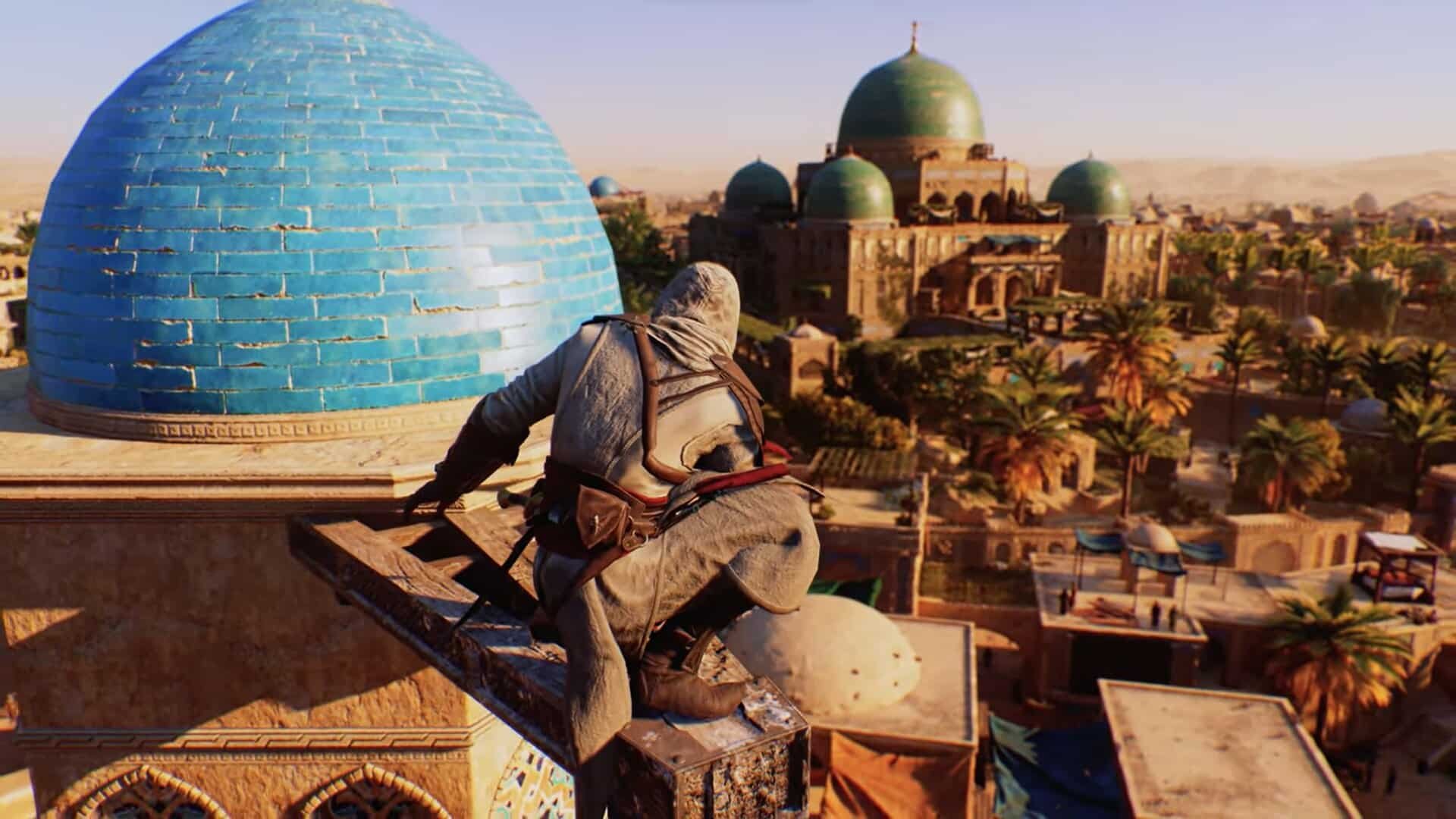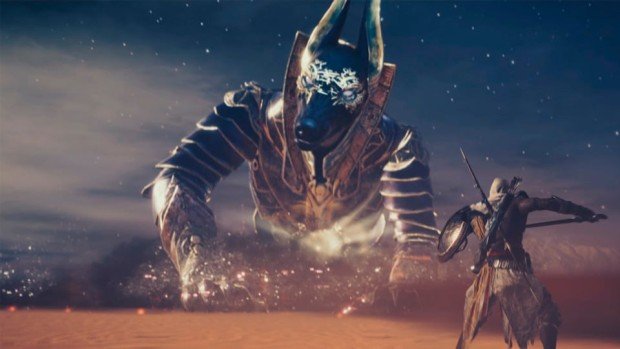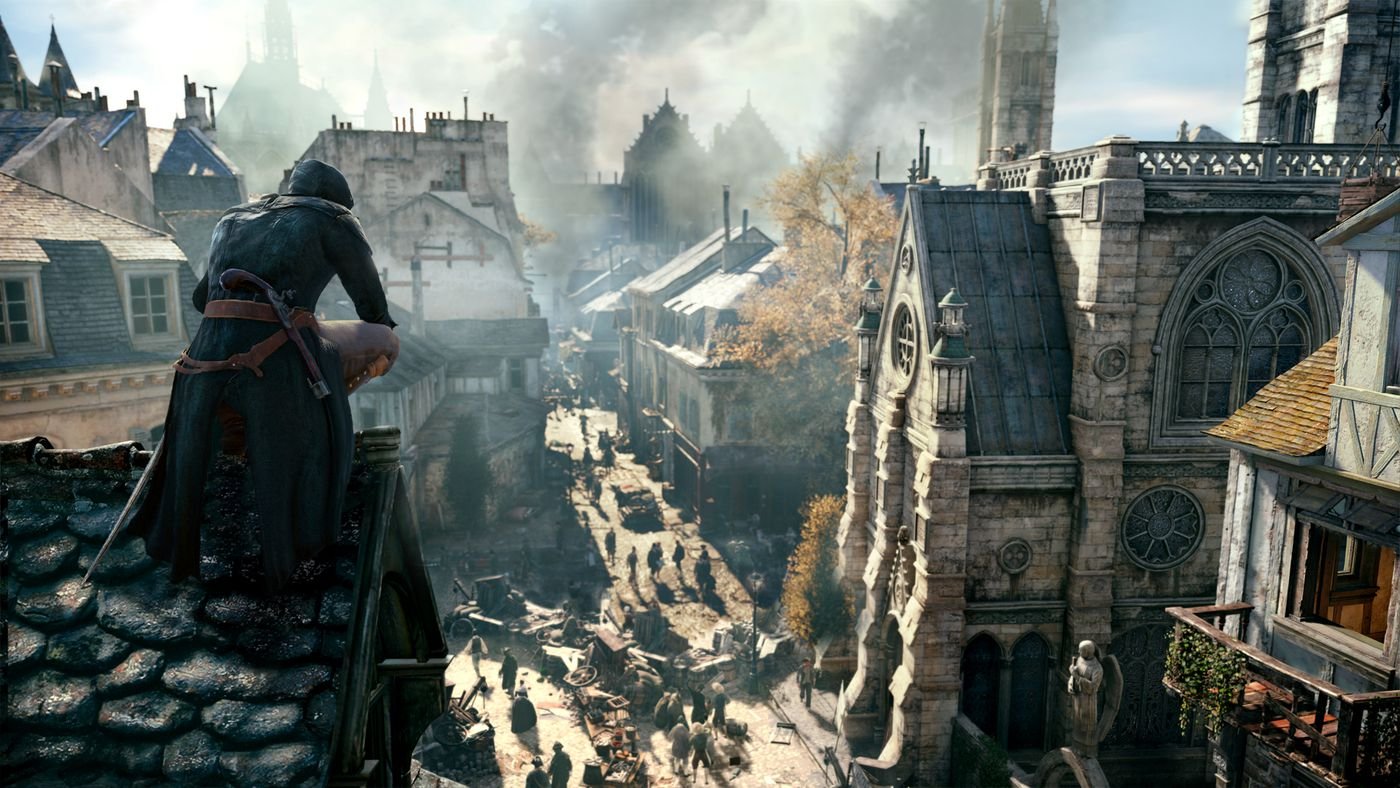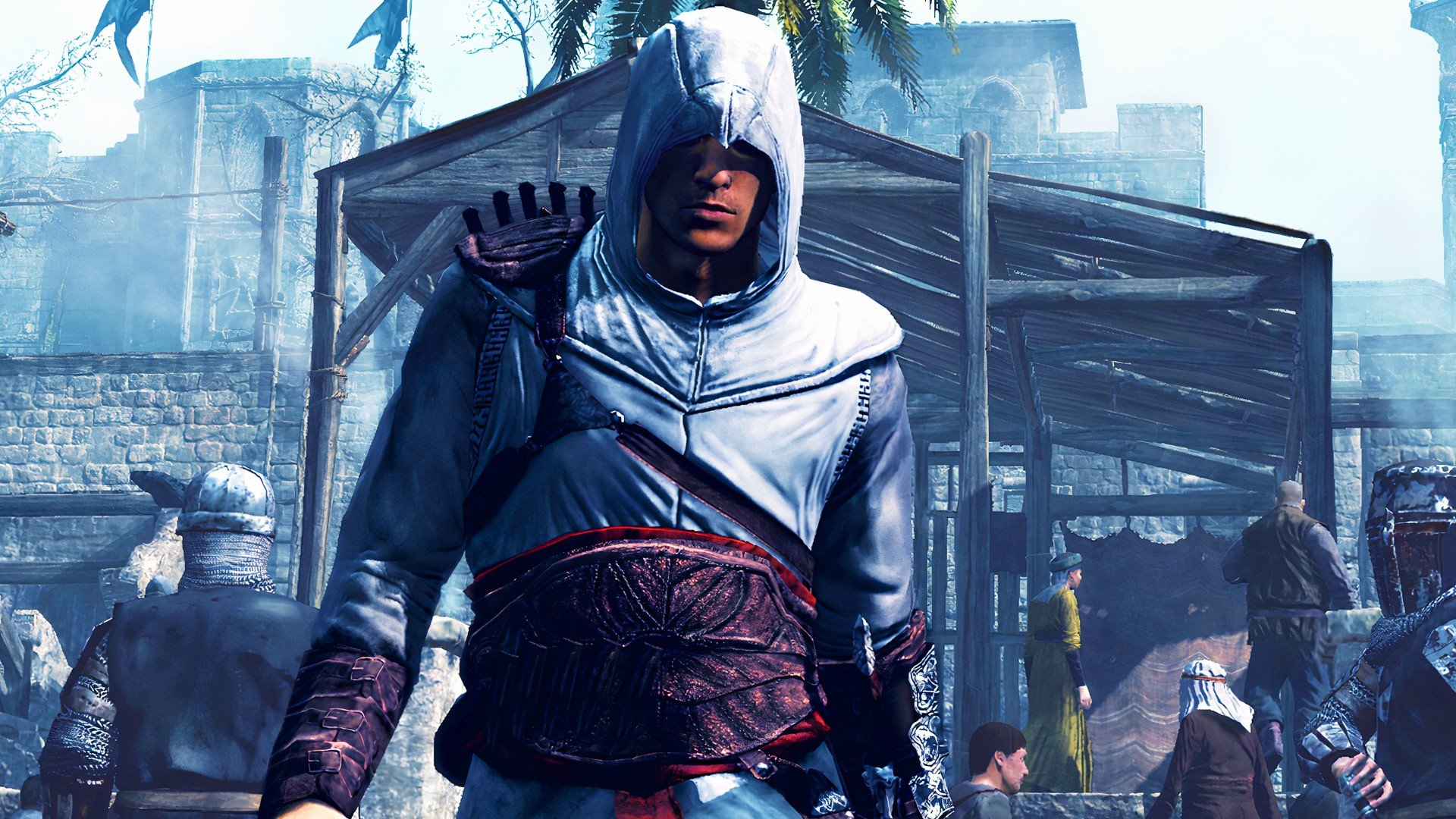Assassin’s Creed Has Lost It Identity But Mirage Offers A Rare Chance To Recapture It
Major spoiler warning for Assassin’s Creed: Valhalla below and a minor spoilers warning for the rest of the series:
The Ship of Theseus poses a simple question with a hard answer. Hoping to fix the ship and maintain its longevity, the old broken planks were removed and replaced with better wood. The philosophers asked, if every part of the ship was individually replaced with new ones, is it still the same ship, or just a new one with the same name?
What even are you?
The same question can, I believe, be applied to the Assassin’s Creed series. (Don’t click away, I have a point, I promise!) In most video game series a player can find some core common threads in the gameplay, the characters and/or the themes, and a good series of games will continually build and improve upon the first. Comparing the first Assassin’s Creed game to the latest, however, feels like comparing apples to oranges, or Hitman to The Witcher. They feel like two games from completely different franchises. It’s almost impossible to believe that they are not only from the same publisher - Ubisoft - but from the same series.
Oh right, these games kinda became God of War in the DLCs…
The AC games have undergone a radical transformation since the release of Origins in 2017. Aspects of the early games that were core elements of the franchise were removed and replaced. What once were story focused, character driven, stealth based games became large open world RPGs, with areas locked behind compulsory XP grinding, a thousand side quests and miscellaneous activities. Gone were the iconic characters of the older games, such as Ezio, Edward or Altaïr, replaced by loosely sketched, blank-slate, player self-inserts whose dialogue you could choose from a menu. The lore of the games also changed, from drip-fed, sparse, sci-fi elements to a more over the top fantastical mythos. In other words, the developers removed the older, ‘out-of-date’ mechanics and themes they felt players were getting tired of in favour of new ones in hopes of updating the series and maintaining its longevity.
If all these core parts are replaced, is Assassin’s Creed in 2023, the same franchise it was in 2007? Many fans of the older games would say, ‘no.’ Having the Assassin’s Creed title does not mean the newer games can so easily lay claim to the same identity as the older ones, especially when they are almost completely unrecognisable to the franchise they first fell in love with. They would rather you group games like Odyssey and Valhalla with The Witcher 3 before you put it alongside an Ezio story.
However, with the announcement of the next main series game, Mirage, Ubisoft has pledged to take the games back to their roots. However, as a long time fan, the question I find myself asking is, ”is this too little too late?” Will the franchise be able to return to its former glory in the eyes of those old players while retaining their newer fans? Or has it lost too much of itself to go back? Moreover, does the series even need to regress to a prior form, or is the past better left behind us?
You know, when it wasn’t a horribly broken mess, Unity was a bit of vibe.
To understand the challenge presented here, we must first look back at the series’ beginnings. The first Assassin’s Creed game, Assassin’s Creed, was a game changer when it was released, and for good reason. Its urban traversal and parkour mechanics were innovative for the time, while a focus on social stealth instead of just trying to stay out of enemies' field of vision was a bold new direction for the genre. This was bolstered by a striking visual style, a deep and dynamic protagonist, and a combination of historical authenticity paired with a background lore that was sparse, but intriguing enough for building upon in sequels. It's a specific, streamlined, and simple game, which really works in its favour.
The gameplay loop of; travel to a new district of The Holy Land, investigate, build up a plan, carry out your assassination, flee, and repeat is incredibly satisfying. As each target is knocked off the list and the player unlocks new abilities/areas, you feel your expertise and skills as an assassin growing. It’s a little repetitive, to be fair, but for a first outing of a new franchise it's fun and interesting. The game is built around behaving like an Assassin, it rewards stealth, sneaking, fluid parkour and encourages hiding and outwitting opponents as opposed to brutalising your way through swaths of enemies. The assassinations themselves are fantastic. The game gives you a space in the city, drops your target somewhere in it, and says ‘okay, off you go, figure it out.’ It’s up to you to investigate and decide on how you want to do the dirty deed and get away.
Oh hello, old friend.
The story follows Altaïr as he grows out of his youthful arrogance into a mature mentor, discovering the corruption at the heart of the order he has dedicated his life to. Despite very few cutscenes, the game gives him and the few characters it does spotlight a wonderful amount of depth. The simplicity of the gameplay and story complement each other, as the story progresses and Altair learns new abilities and secrets, so too does the player. Your confidence in approaching each new target grows with Altair. As Altair grows in experience, so does the player, their progression tied together. Where later games like Odyssey become endless epics through every major historical event during the period, the first Assassin’s Creed is dark and claustrophobic, and focuses on a handful of key character driven moments that occasionally intersect with real history. The game does not strive for scale or vastness, and it isn’t here to take you on a tour, but what it does aim to accomplish it does so to perfection.
This was then followed by the Ezio Trilogy, three games that many (if not most) consider to be the highpoint of the series. These games were more fleshed out than the first, more detailed. But the good parts of the original Assassin’s Creed are still visible in each of these three games. The city settings (Florence, Venice, Rome and Istanbul) are still the beating heart of the games, but now they are bigger and more complex, with improved crowds that move in a lifelike and dynamic manner, more fluid parkour makes traversing them feel better than ever, and a greater variety of missions forces you to approach problems in new ways. The game still rewards stealth but gives more options on how to accomplish your goals in secrecy. The story went the same way, as while the characters are still complex, fighting for the same cause, this time they are more fleshed out, helped by much more cinematic cutscenes. Ezio - a character the player follows from youth to old age - is wonderfully dynamic, complex, charming, and fun. His supporting cast was similarly expanded. It’s a very different game from the first, but undeniably Assassin’s Creed.
Weirdly enough, an assassin is only like the 4th or 5th most deadly thing in Industrial Revolution London…
By the release of Syndicate in 2015, however, many fans felt the series had entered a formulaic rut. I cannot fault this argument; for years Assassin’s Creed had simply been at a plateau. Not getting worse, but not getting better either. And as soon as sales and interest started to drop slightly it was time, Ubisoft decided, for a revamp and so - after a break from the yearly instalments - released Origins (2017), Odyssey (2018), and Valhalla (2020).
It’s hard to overstate how enormous the Odyssey map is, but this is just a fraction of it.
Of the three, Origins is most similar to the series roots. The structure and mechanics of the game are still wildly different, as well as the huge map, the focus on open world traversal, and RPG combat, but it retained a single character focus on Bayek and the Brotherhood of Assassins. Odyssey did away with these final elements of familiarity, doubling down on an even larger scale and the deeper RPG elements, its even set before the Assassin’s existed without a defined character as the protagonist. In allowing the player more control over the protagonist, neither Evior nor Kassandra/Alexios feel like defined characters, they feel like blank slates. They lose their specificity and as a result their motivations feel vague and sort of empty. This kind of player character is a lot of fun in many RPG’s, but its introduction in Odyssey was a sharp change of direction for Assassin’s Creed.
These changes almost completely divorced these games from the previous entries in the series. They have the title, but not the aesthetic, story, or feel. No longer were the games streamlined and story focused; now they were big, sprawling, and aimless, taking tens or hundreds of hours to complete with each new area locked behind a minimum level requirement and hours of compulsory grinding. The worlds were no longer dense, detailed urban environments, but massive expanses of land that often felt empty. No longer did the gameplay reward behaving like an Assassin, in fact, in two of the three RPG titles, the player isn’t an Assassin. Odyssey and Valhalla both follow warrior type characters, and so the games push the player towards big, brutal, group combat. The Assassin’s themselves are not even present in Odyssey, and they only play a side role in Valhalla. It was as if the series had become embarrassed by its very own premise and sought to distance itself from the order.
Oh hey, Baldur’s here!
Now in 2023, Assassin’s Creed: Mirage has a daunting task ahead of it. From what we know so far, the developers seem committed to a return to the franchise’s roots. Mirage promises to be a much smaller experience, both in runtime(around 25 hours to beat compared to Valhalla’s 50+) and spatially, with the game map comprising just the city of Baghdad and fortress of Alamut. This setting should be more akin to something like Unity’s Paris, which, if they manage to pull it off, would be a wonderful return to form. For all of Unity’s flaws, its depiction of revolutionary Paris was breathtaking; one of the best locations in the franchise’s history. If Baghdad could replicate the thriving streets, the bustle, the chaos, and crowds of a living city, it would be a fine setting for a good Assassin’s Creed game. Ubisoft has also promised a return to social stealth based gameplay, which, considering the technological advances since the release of Syndicate, gives the team the potential of creating deeper and more complex systems that will hopefully act as a fun playground to experiment in.
From gameplay trailers, the parkour system and animations have more in common with Unity than Origins or Valhalla, which is a good sign. The architecture shown off so far also suggests a variety of options for the player in how they approach targets, be it from above, from a hiding place on the ground or through use of a smoke bomb or blow art, before fleeing and disappearing into the city streets and rooftops. Concerningly for some players, however, Ubisoft has also confirmed the return of microtransactions, a large part of the experience in Odyssey and Valhalla.
So tell us, what are you going to be now?
There is more to Assassin’s Creed than gameplay, though. Mirage also promises to do away with the ill-defined protagonists of Odyssey and Valhalla, and promises to deliver a character focused story, following Basim Ibn Ishaq. Basim, of course, already made his debut in Valhalla, in which he is introduced as an assassin and eventually revealed as the reincarnation of Isu Loki and the final villain of the game. Mirage will follow Basim a decade before the events of Valhalla, which could make for an intriguing story but also has the potential for issues. Given that we already know where his story will end up, I can’t help but wonder if he will be a harder character for the audience to latch on to than Ezio or Altair, who were fresh to the audience. What is the motivation for me as a player, to get to know this version of Basim if he's only going to break bad and die in a few years after the game ends? On the other hand, Rogue managed to make Assassin-turned-Templar Shay into one of its more sympathetic characters, despite him working for the enemy faction. Assassin’s Creed’s stories are often at their best when working within the morally grey. These conflicts between good and evil are at the centre of the first game, for example, with Altair’s discovery of the villainy within his own Assassin Brotherhood. If Mirage is able to weave this complexity into Basim’s story, that truly would be a return to its old identity.
“Whatcha talkin bout?”
”Oh nothin, just murder stuff.”
Assassin’s Creed has long been a series close to my heart; the first series I remember truly falling in love with. I eagerly watched compilation videos of the trailers, and, when I was old enough, dutifully played each entry in order. No other franchise has, in its entirety, captured my attention and love as much as this series has with every single game. Whether or not Mirage will capture my interest as those first games did is yet to be seen. But I really, really hope it does. I miss them.















